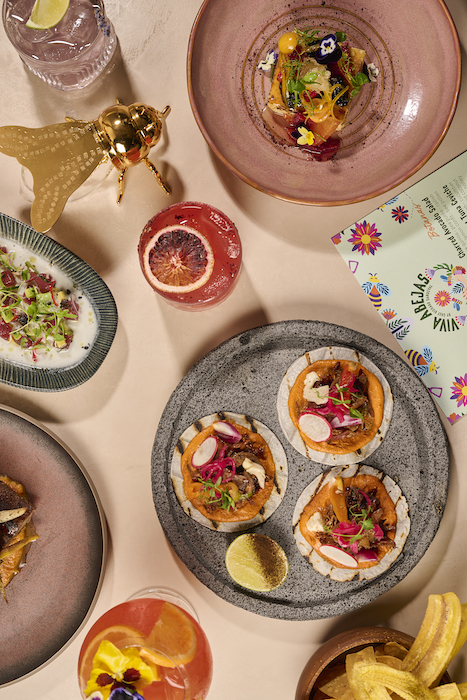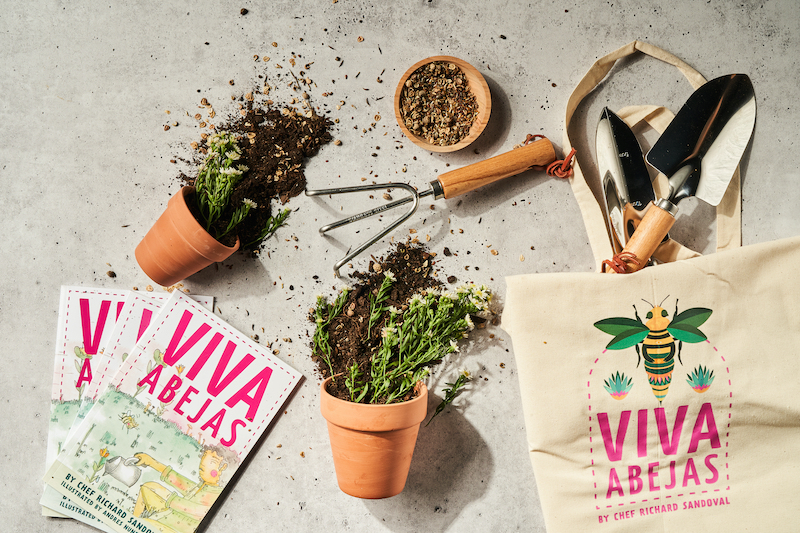BY MISTY MILIOTO
Award-winning chef and restaurateur, Richard Sandoval of Richard Sandoval Hospitality, has been passionate about food — and the ingredients that shape our cuisine — for as long as he can remember.
“It’s deeply connected to my heritage and upbringing,” he says. “My father was a restaurateur, and I grew up watching how food brought people together.”
After training at the Culinary Institute of America, Sandoval worked his way up in the industry, always pushing the boundaries of modern Latin cuisine. He opened his first restaurant, Maya, in New York City’s Upper East Side in 1997 (it’s still open today) and launched his most recent restaurant, Lona, in Nashville, in January. Today, he leads a restaurant group with more than 60 restaurant locations around the world.
And of utmost importance, RSH incorporates sustainability in a number of ways. In addition to focusing on responsible sourcing and reducing food waste, the restaurant group also supports local farmers who practice sustainable agriculture. “Sustainability isn’t just a single initiative — it’s part of our culinary philosophy,” Sandoval says. “Chefs have a unique platform — we don’t just serve food, we tell a story with every dish.
Sustainability isn’t just a trend; it’s a responsibility. Our industry depends on healthy ecosystems, and, as leaders in hospitality, we have the power to inspire change through food, education, and action.”
For example, in 2024, Sandoval partnered with the Four Seasons Hotel Austin and Free Range Beehives to install three free-range beehives at his restaurant, Ciclo, to support sustainability efforts. Each hive houses thousands of bees. “We anticipate a first-year yield of 90 to 300 pounds of honey, which we’ll use in our restaurant menus and in other ways,” he says. “These hives help pollinate the surrounding landscape and contribute to local biodiversity. And in Mexico, we’ve installed beehives in Alma Finca Orange Liqueur’s orchards — showcasing how essential bees are, even in making the cocktails we drink.”

This year, RSH restaurants in Austin, Denver, Scottsdale, New York City, Chicago, and beyond are bringing awareness to this cause with bee-centric food and drink menus. “We’re celebrating the vital role of bees through a curated menu collection that highlights honey, pollinated fruits, and bee-friendly ingredients,” Sandoval says.
Available dishes include coconut tuna ceviche with red onion, mint, radish, cucumber, avocado, Fresno chili, toasted coconut, and orange blossom honey; duck confit tacos with blue corn tortillas, pickled vegetables, cilantro, agave honey, and peanut pipian sauce; braised short ribs with honey-glazed sweet potato, roasted heirloom carrots, chimichurri, and grape demi-glace; and honey vanilla cheesecake with macerated citrus, honeycomb, mint, and mixed berries flambéed in Alma Finca Orange Liqueur.
Meanwhile, bee-centric cocktails include the Honey Symphony with gin, honey, lime, coconut cream, Alma Finca Orange Liqueur; and matcha sesame; the Honey Lavender Margarita with tequila blanco honey lavender, crème de violette, and Alma Finca Orange Liqueur; the Margarita Royale with tequila blanco, Alma Finca Orange Liqueur, honey passion fruit cordial, lime, bee pollen, and edible flowers; and The Beekeeper, featuring single malt whiskey, rosemary, ginger, honey, lime, mint, cucumber, and ginger beer.
Mocktail options also are available, such as the Golden Melody with honey, chamomile tea, ginger beet, lemongrass, and orange; and the Honey Hibiscus Mocktail with honey, hibiscus, ginger, soda, cucumber, and edible flowers. “Many of these ingredients — such as the oranges in Alma Finca Orange Liqueur — are pollinated by bees from our Viva Abejas beehives in Merida, Mexico,” Sandoval says.

His passion for cuisine, its ingredients and the importance of bees, also led Sandoval to write a children’s book, Viva Abejas (Amazon Publishing), to educate kids about the vital role of bees in our ecosystem. “When I learned that one in every three bites of food we eat relies on bees, I knew I had to take action,” he says. “Viva Abejas was born from a desire to give back to these incredible pollinators and educate future generations about their importance. I wanted to reach the next generation in a way that felt engaging and accessible.”
Viva Abejas, which translates to “Long Live Bees,” tells the story of a young boy named Ricardo who learns from a Queen Bee about pollination and conservation, inspiring kids to take an active role in protecting bees and their habitat. “The book highlights the essential role bees play in food production and biodiversity,” Sandoval says. “To make the story interactive, the book includes a glossary, discussion questions, and even my signature guacamole recipe — bringing the themes of the book to life in the kitchen.”
Viva Abejas, which is available in both Spanish and English, ships via Amazon Prime to 11 countries in paperback ($10) and hardcover ($20) formats. One hundred percent of proceeds benefit The World Bee Project. “[This] organization aligns with my mission of sustainability and environmental stewardship,” Sandoval says. “Their World Hive Network is the first global initiative to track honeybee health and wild bee populations using AI and big data. Their goal is to restore local bee populations and create sustainable habitats where they can thrive.” Overall, Sandoval notes that protecting bees isn’t just about conservation.
“It’s about preserving the future of our food,” he says. “Through Viva Abejas, our beekeeping initiatives, and restaurant programs, we’re committed to making a lasting impact. I also encourage readers to consider donating books to a Boys and Girls Club or a local school to spread the message to the next generation. Together, we can create a world where bees — and our food systems — continue to thrive.” For more, visit www.richardsandoval.com/viva-abejas.





